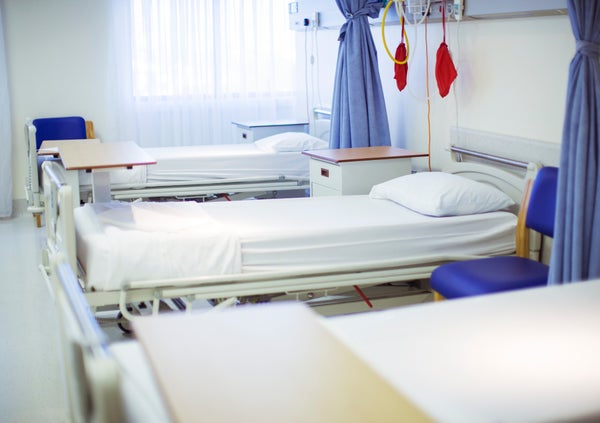WASHINGTON—Two of the nation’s leading medical centers have identified nearly two dozen patients who were scheduled to come to the United States to receive medical care from the countries subject to President Trump’s executive order on immigration.
Johns Hopkins Medicine has found at least 11 patients who live in the Muslim-majority nations targeted by the immigration ban—Iran, Iraq, Libya, Somalia, Syria, Sudan, and Yemen—and who were set to travel to the United States in the next 90 days for medical care. Another major health system, Cleveland Clinic, told STAT that it had nine patients scheduled to come to the United States for care from the affected countries.
“These are very, very ill patients,” Pamela Paulk, president of Johns Hopkins Medicine International, told STAT. “In most cases, these are not cases to be postponed.”
On supporting science journalism
If you're enjoying this article, consider supporting our award-winning journalism by subscribing. By purchasing a subscription you are helping to ensure the future of impactful stories about the discoveries and ideas shaping our world today.
Paulk could not immediately identify the patients or their medical conditions. She said that they should already have secured visas for travel to the United States. But the medical center is concerned that the patients will not be permitted to enter the country.
Trump, who pledged to institute a ban on Muslim immigration during the campaign, on Friday signed an executive order restricting immigration from seven countries, saying the measure was important for national security. The order was met with immediate outcry, protests, and lawsuits.
Johns Hopkins Medicine regularly brings patients to the United States from the Middle East for care, Paulk said. They are usually patients whose difficult cases cannot be fully treated in their native country: neurosurgeries, complex spine surgeries, bone marrow transplants, and the like. The center is working to contact patients and figure out if their care can be postponed.
If not, the center could send Hopkins staff internationally to treat these patients or try to find another health system outside the United States that could care for them.
“It’s always health care they can’t get in their country,” said Paulk, who was attending a medical conference in the United Arab Emirates. “They’re just not able to do the same things we can do in the US. The very difficult cases end up getting referred, and many of them are referred to us.”
Other major US medical centers are contending with the same issue and expect they will have patients affected. International groups that work to help those patients warned of the potential toll of Trump’s action.
“Opportunities to get the kind of medical care that comes with moving to the US will be lost, some of whom have waited years in this process,” said Jason Cone, the executive director of Doctors Without Borders.
Patients trying to travel to the United States for health care can request a medical visa—but to get it, they have to carefully document their plan for care. Patients must submit confirmation from a hospital or doctor that details the exact care they’ve agreed to provide. Medical visa applicants also have to demonstrate that they can pay for their care, or that a hospital has agreed to provide services pro bono.
Cone said he’s particularly concerned about the impact of the order on the health of Syrian refugees.
“Entire health systems have been completely disrupted,” he said.
The health care system in Syria has been devastated by five years of conflict; numerous hospitals have been destroyed in airstrikes. Health care facilities in neighboring Jordan and Lebanon have been flooded by patients in recent years—1 in 4 individuals living in Lebanon and 1 in 10 in Jordan are Syrian refugees. The order could make it impossible for the US to lessen the burden on those strained systems.
Other experts are concerned more patients will be affected in the coming weeks.
“That list of countries can be added to at any time,” said Meredith Fortin, an asylum and immigration expert at Physicians for Human Rights. Fortin also said she’s concerned the Trump’s ban—which lasts 90 days—could be extended.
“We have to remain vigilant, she said. “This could start to pull in a lot more people than it currently is and start disrupt a lot more lives.”
Doctors Without Borders has said it will continue its efforts to provide care to displaced people.* The group is also calling on Trump to lift the suspension on refugee resettlement immediately.
“Anything that prevents people who have been incredibly victimized from having some possibility of a future is going to have a direct impact on their mental health and can have an impact on their medical care for physical conditions,” Cone said.
Paulk said Johns Hopkins has heard concerns from patients in countries not affected by Trump’s executive order. She said one patient from the United Arab Emirates had texted her staff, seeking reassurance that the patient would still be able to enter the United States. Another family of a patient coming to America for care had left their young adult son at home, for fear that he wouldn’t be allowed in, she said.
Patients coming from the countries named in Trump’s order were also likely planning to bring one or more family members, Paulk pointed out. They need emotional support and someone to care for them before and after their treatment. Those family members could also be hindered under the new restrictions.
“They’re sick. They’re going to a foreign country they’ve probably never been to,” Paulk said. “To have them worried that they’re going to be detained is just too scary.”
*Update (1/13/17) : This story has been updated to clarify the international efforts of Doctors Without Borders.
Republished with permission from STAT. This article originally appeared on January 30, 2017
